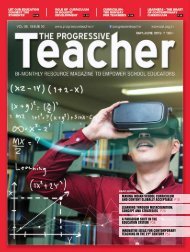The Progressive School Vol 02 Issue 04
The Progressive School is a quarterly magazine for school owners, leaders and principals. It will continue to address vital issues that impact the emerging challenges in the design, administration and growth of schools in all its dimension.
The Progressive School is a quarterly magazine for school owners, leaders and principals. It will continue to address vital issues that impact the emerging challenges in the design, administration and growth of schools in all its dimension.
Create successful ePaper yourself
Turn your PDF publications into a flip-book with our unique Google optimized e-Paper software.
need to adapt oneself to the frequency<br />
of change in knowledge management.<br />
Academic leaders are required to respond<br />
to these both purposefully and effectively.<br />
Sensitivity to learning cultures will define<br />
the quality of academic leadership of the<br />
future.<br />
Engage with change<br />
as a team<br />
<strong>The</strong> journey of an academic leader is<br />
not exclusive. He has to lead a core team<br />
in chasing the change and to engage with<br />
change for growth and development. It<br />
is, therefore, important for an academic<br />
leader to organize, manage and lead a<br />
learning team so that his responsibilities<br />
of an academic leader are manifested<br />
into a shared vision. No academic<br />
progress is individualistic. It is conceptual<br />
engagement which is immersed in<br />
appropriate skills. <strong>The</strong> development of<br />
a conceptual change in the universe of<br />
academics needs progressive diffusion of<br />
new knowledge, competence and skills.<br />
An academic leader cannot make this<br />
journey as individual and has to ensure<br />
it as a team work. This alone could help<br />
in acknowledging and sustaining the<br />
leadership.<br />
Focus on changing<br />
behaviour than skills<br />
An effective change should lead to<br />
transformation. Transformation largely<br />
involves both attitude and behaviour.<br />
Hence the academic leader should work,<br />
bringing about a change in the mindset,<br />
consequent to any new learning rather<br />
than simple acquisition and exhibition<br />
of new skills. Superficial demonstrating<br />
of new skills might have more cosmetic<br />
value and help in exhibitionism rather<br />
than an organizational transformation.<br />
Academic leaders would be successful<br />
only when they mentor transformation.<br />
Lead the change<br />
Promotional activities about<br />
organizational change could lead to<br />
thrill, challenge or fear. In an academic<br />
engagements, changes happen much<br />
slowly as compared to other business<br />
or formats of work. <strong>The</strong> measurement of<br />
the impact of change and change impact<br />
analysis are quite a long and strenuous<br />
process. Hence the personal engagement<br />
of the academic leader with the change<br />
and to lead the change is vital to any<br />
institutional set up. Unless there is a clear<br />
evidence of the leader being a part of the<br />
change process, the confidence profile<br />
of the team would be low and weak. An<br />
academic leader who leads the change<br />
ensures not only his personal growth<br />
and of his team, but of the organization<br />
as a whole.<br />
Align the process<br />
with results<br />
In many academic set ups, the<br />
process and results are largely viewed<br />
independently, least realizing the latent<br />
relationship with the two. In a number of<br />
cases, the results are considered more as<br />
a data rather than as reflections of inputs<br />
to the processes that lead to results. <strong>The</strong><br />
underlying reason for this is either lack<br />
of alignment between the process and<br />
the results or the improper correlation<br />
that is established between them. While<br />
pedagogues tend to focus on processes,<br />
the managers and administrators tend to<br />
focus on results. Such inadequacies exist<br />
both at the micro level as well as at the<br />
macro level. An effective academic leader<br />
builds his vision keeping them in tandem.<br />
Competing with the self<br />
Academic leadership is highly noncompetitive.<br />
It is a personal branding of an<br />
academician to a world he engages with.<br />
<strong>The</strong>refore, it is self-nurturing process and<br />
has to be full of life. Any comparison of<br />
an academic leader with others except<br />
the self is a deceitful process. It could be<br />
referral but non-prescriptive. <strong>The</strong> only way<br />
an effective academic leader can sustain<br />
his leadership is through a competition<br />
with the self, demonstrating a continuous<br />
progress of the levels of learning and<br />
empowerment of the learning curve. As<br />
the domains of knowledge and skills of<br />
each leader has a variant, the growth<br />
and development happen by redefining<br />
the self.<br />
Enlarging the spectrum<br />
<strong>The</strong> universe of operation and<br />
performance of an academic leader is<br />
continuously enlarging. <strong>The</strong> spectrum<br />
of knowledge, skills and competencies<br />
continuously demand newer approaches<br />
and domains of knowledge. Both<br />
convergence and divergence of knowledge<br />
impact the learning spectrum and its<br />
consequent behaviour. <strong>The</strong>re has to<br />
be no road blocks to this engagement<br />
with larger vistas of knowledge. If any,<br />
they need to be removed to ensure the<br />
expansion of knowledge spectrum.<br />
www.progressiveschool.in<br />
JUL-AUG-SEP 2018<br />
THE PROGRESSIVE SCHOOL<br />
55

















